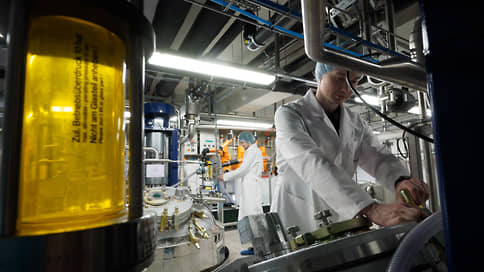French Sanofi retains patent for Toujeo long-acting insulin glargine
[ad_1]

Russian “Geropharm” once again failed to challenge the patent for long-acting insulin glargine “Tujeo”, produced by the French Sanofi. This is one of the drugs in demand in the state segment: in just six months, the volume of its purchases exceeded 3 billion rubles. Geropharm has been trying to challenge the patent for this type of insulin for six years. The company has registered an analogue, but so far it can only produce it in Kazakhstan, since Sanofi has a patent for the original product in Russia. Geropharm can challenge the intellectual rights of the French an unlimited number of times, lawyers say, but it is not certain that the result will be in its favor.
“Kommersant” found in the database of Rospatent published on August 26 the decision of the board of the service on the second objection of Geropharm to the grant of a patent for long-acting insulin glargine “Tujeo” from the French Sanofi. The Collegium refused Geropharm to challenge the patent. This is the fifth time this has happened.
Geropharm filed its first objection back in 2017: it was also rejected by the Rospatent Board. The company has been challenging the refusal in intellectual property court for several years. In 2020, the court ruled in favor of Geropharm, but Sanofi challenged this decision. A year later, the court again ordered Rospatent to review the objection, but at the end of 2022, the board of the service again decided in favor of Sanofi.
In parallel, in 2021, Geropharm filed a second objection to the grant of a patent for Tujeo. In January of this year, the board refused the company on this objection, but then the head of Rospatent, Yuri Zubov, did not approve the decision and sent the objection for a new consideration. Now the decision has been published, which means it has been approved and entered into force.
Sanofi first marketed single-strength insulin glargine under the Lantus Solostar brand. After the patent expired in 2012, the company registered the drug in a different concentration under the brand name “Toujeo”, pre-patenting it until 2031.
This is the most purchased drug in the state segment: in January-June 2023, Tujeo was purchased for 3.11 billion rubles, follows from Headway Company data. It accounted for over 80% of all purchased insulin glargine. At the same time, the share of this drug amounted to 27.6% of the total public procurement of all insulin preparations.
Mikhail Murashko, Head of the Ministry of Health of the Russian Federation, in March 2022:
“There was tension regarding insulin, but I want to say right away that there is no shortage.”
Geropharm has released an analogue of Lantus Solostar, replacing the original drug in public procurement. And in November 2022, he registered an analogue of Tujeo – Ringlar300. So far, the company cannot bring it to the Russian market, but is going to organize production in Kazakhstan, where Tujeo is not protected by a patent.
Geropharm estimates the need for Ringlar300 in Kazakhstan at 120,000 packs per year. At the same time, in Russia, only in the first half of the year, according to estimates by Headway Company, contracts were signed for the supply of 790.1 thousand packages of Tujeo.
Sanofi told Kommersant that they were satisfied with the decision of Rospatent, but were concerned that an analogue of Tujeo and the maximum price for it were registered in Russia. In October, the Moscow Arbitration Court will consider Sanofi’s claim against Geropharm and the Ministry of Health: the company is challenging the production of a generic.
Geropharm says that they plan to apply to the intellectual property court to challenge the conclusions of Rospatent. They call the decision of the service “partly expected” and indicate that the board considered the objection “almost the same composition” as in January. Rospatent, among other things, did not consider the data on the refusal of Sanofi to issue a similar patent in China, citing differences in legislative approaches to determining patentability, the company says. But the patent legislation in the two countries is largely harmonized, Geropharm insists.
The company has three months after the decision is made to challenge it, says Mikhail Pasynok, head of the Chemistry and Pharmaceuticals department at Online Patent. In addition, according to him, Geropharm may file another objection with new arguments. According to Ekaterina Tilling, partner and head of the intellectual property practice at Birch Legal, a patent can be challenged an unlimited number of times on various grounds. Mykhailo Pasynok notes that in October the Board of Appeal of the European Patent Office will consider the objection from another applicant against the European patent for Tujeo.
[ad_2]
Source link





